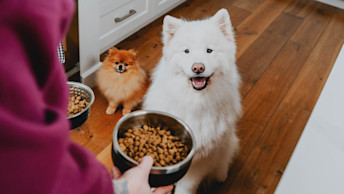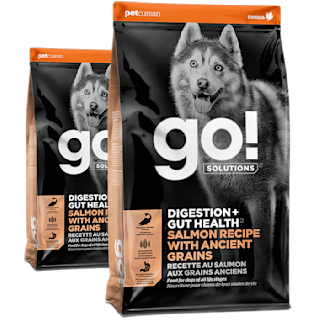April 27, 2023
An Investigation Into the Gut Microbiome: Go! Solutions Digestion + Gut Health

As pet parents, we all know that the quality and consistency of our pets’ poop is one of the first things we consider when looking at our pet's health. A good quality stool can be an indicator of overall good health and them feeling good. So, what’s the solution? It often has to do with your pet’s gut health and their gut microbiome.
The term "microbiome" describes the population of microorganisms living in a certain environment. There are multiple microbiomes in your pet’s body, and in your body too – these areas include on the skin, in the mouth, and in the digestive system, also known as the gut microbiome.1 The gut microbiome is involved in many bodily processes, and when it's healthy, this population promotes good digestion, stool quality, and simply overall health.
When the gut microbiome is thrown out of balance, due to stress or an abrupt food change, it allows unfriendly bacteria to multiply. This disruption in the microbiome can also cause normally beneficial bacteria to overgrow, causing a negative population shift. This is known as dysbiosis and can result in gastrointestinal upset and distress.2
Gut health has rapidly become a very important focus for pet parents, as a healthy gut is a crucial part of pets’ overall wellness. Go! Solutions Digestion + Gut Health Salmon Recipe with Ancient Grains for dogs was created for pets by our team of nutritionists to focus on the importance of gut health, supported by evidence.

Digestion + Gut Health
Ancient-Grain Solutions to Support Healthy Digestion
Go! Solutions Digestion + Gut Health Salmon Recipe with Ancient Grains for dogs is positioned for pet parents searching for a gut-focused, overall wellness recipe, supported by scientific evidence.
View Product Details
Backed by science
We conducted a study with 24 client-owned, healthy dogs to evaluate the effectiveness of our Digestion + Gut Health Salmon Recipe in supporting a healthy gut microbiome. During this study, dogs were fed the Digestion + Gut Health Salmon Recipe, and a control diet for 30 days each. We asked pet parents to collect stool samples in various stages of the study, which were then sent out for microbiome analysis.3 We also asked pet parents to score their dogs stool quality using a provided fecal scoring chart (Figure 2).
Reduction in harmful bacteria
Once we obtained the results, it was revealed that when the dogs were fed the Digestion + Gut Health Salmon Recipe there were notable reductions to the amount of Escherichia and Streptococcus, which are pathogenic bacterial groups, in their gut microbiome in comparison to the control diet (Figure 1).

Figure 1. Average bacterial read counts for differentially abundant bacteria. *Bacterial read counts were CLR-transformed
We also saw that when fed the Digestion + Gut Health Salmon Recipe, dogs had significantly improved fecal scores compared to control. When on the control diet, dogs had a median fecal score of 4, and when on the Digestion + Gut Health Salmon Recipe, they had a median score of 3, or ideal.

Figure 2: Fecal scoring chart provided to study participants to assess stool quality, provided by AnimalBiome. Type 3 is considered ideal, whereas 1-2 are associated with constipation, 4-5 with loose stools, and 6-7 with diarrhea.
Harmful bacteria and loose stool
There are many issues that can arise from having elevated levels of both Escherichia and Streptococcus bacterial groups in the microbiome. They are associated with chronic small intestine diseases, and other gastrointestinal disorders, in addition to general dysbiosis.4,5,6 With Escherichia specifically, dogs with an overgrowth are more likely to have inflammatory bowel disease and suffer from diarrhea.7 Although some Streptococcus can be part of a healthy microbial population, an overabundance is associated with gastrointestinal issues.8 The trend of reduction of these two bacterial groups in dogs fed the Digestion + Gut Health Salmon Recipe suggests that this recipe has positive effects on gut health.
Most pet parents know very well what can happen if you transition your dog too quickly from one recipe to another, and for some, the process can be a nightmare. Diet changes can be stressful for the gut microbiome and can trigger gastric upset and loose stools. As expected, when transitioned to the control recipe the dogs had an increase in loose stool frequency and a worse stool score. However, when the dogs were transitioned to the Digestion + Gut Health Salmon Recipe we did not see a negative impact on either the stool score or loose stool frequency. This suggests that there was a protective effect when feeding this recipe on transition related digestive upset.
For pet parents, stool quality is often one of the most crucial indicators of if their pet is doing well on a given recipe. When the dogs were being fed Digestion + Gut Health Salmon Recipe, stool score was significantly improved, and the frequency of loose stools was reduced.
Conclusion
Overall, the Go! Solutions Digestion + Gut Health Salmon Recipe with Ancient Grains for dogs had notable reductions of the pathogenic groups in the gut microbiome that have been linked to gastrointestinal disease, diarrhea, and dysbiosis. The dogs fed this recipe showed significant improvement of fecal score and quality, particularly when transitioning – which is often stressful on the gut. These improvements offer every-day support to pet parents looking for an option to support a healthy microbiome for their pets.
Marchesi, J.R., & Ravel, J. 2015. The Vocabulary of Microbiome Research: a Proposal. Microbiome. 3.
Zmora, N., et al. 2019. You are what you eat: Diet, Health and the Gut Microbiota. Nature Reviews. 16.
Jarett, J., et al. 2019. Diets with and without edible cricket support a similar level of diversity in the gut microbiome of dogs. PeerJ. e7661.
AlShawaqfeh, M. K., et al. 2017. A Dysbiosis Index to Assess Microbial Changes in Fecal Samples of Dogs with Chronic Inflammatory Enteropathy. FEMS Microbiology Ecology. 93
Pilla, R., & Suchodolski, J.S. 2019. The Role of the Canine Gut Microbiome and Metabolome in Health and Gastrointestinal Disease. Frontiers in Veterinary Science. 6.
Minamoto, Y., et al. 2019. Fecal Short-Chain Fatty Acid Concentrations and Dysbiosis in Dogs with Chronic Enteropathy. Journal of Veterinary Internal Medicine. 33(4).
Jarett, J., et al. 2020. Defining Healthy: The Utility of Building a Companion Animal Fecal Microbiome Reference Dataset. Presented at the American College of Veterinary Internal Medicine.
El Aidy, S., et al. 2015. The Small Intestine Microbiota, Nutritional Modulation and Relevance for Health. Current opinion in Biotechnology. 32.
Authors



